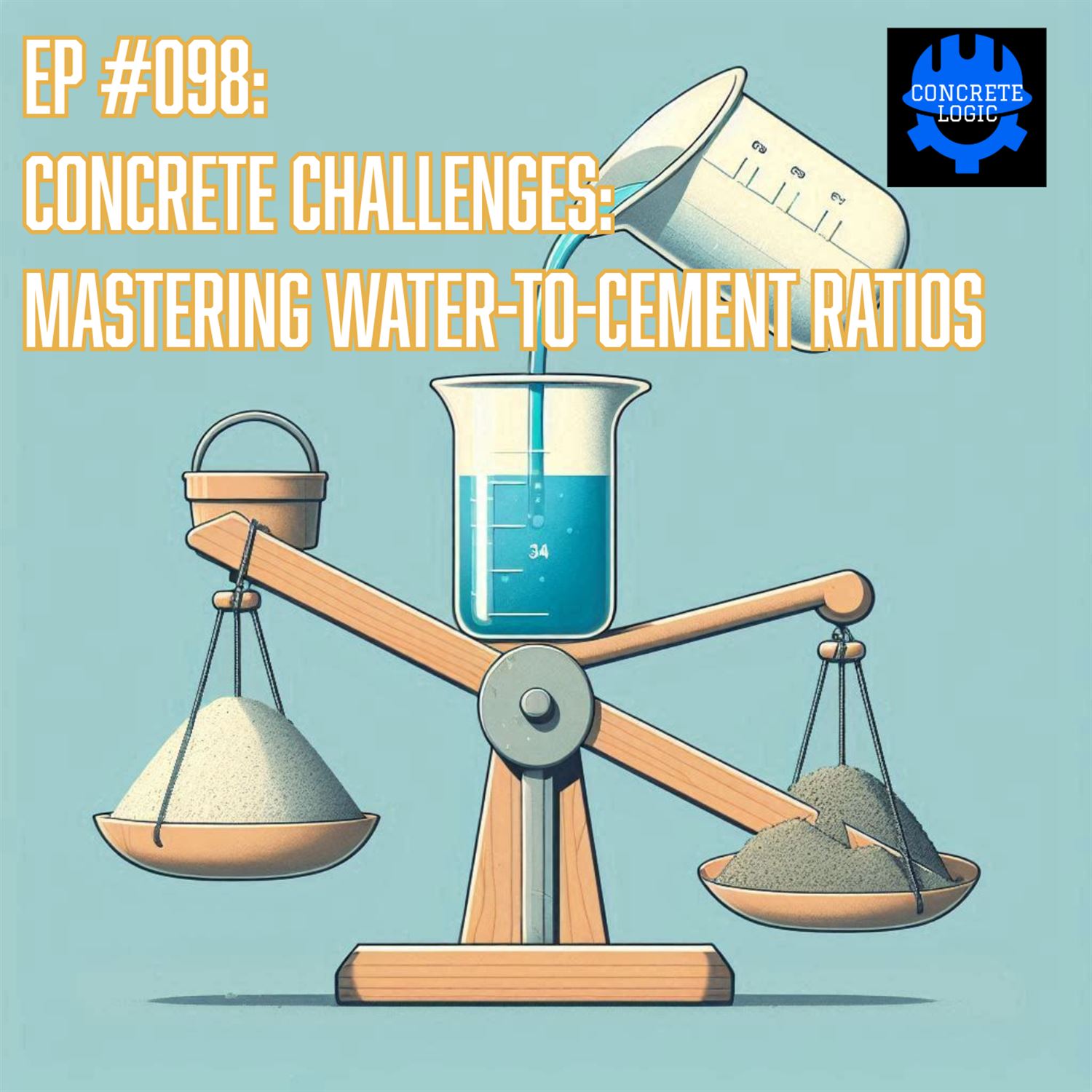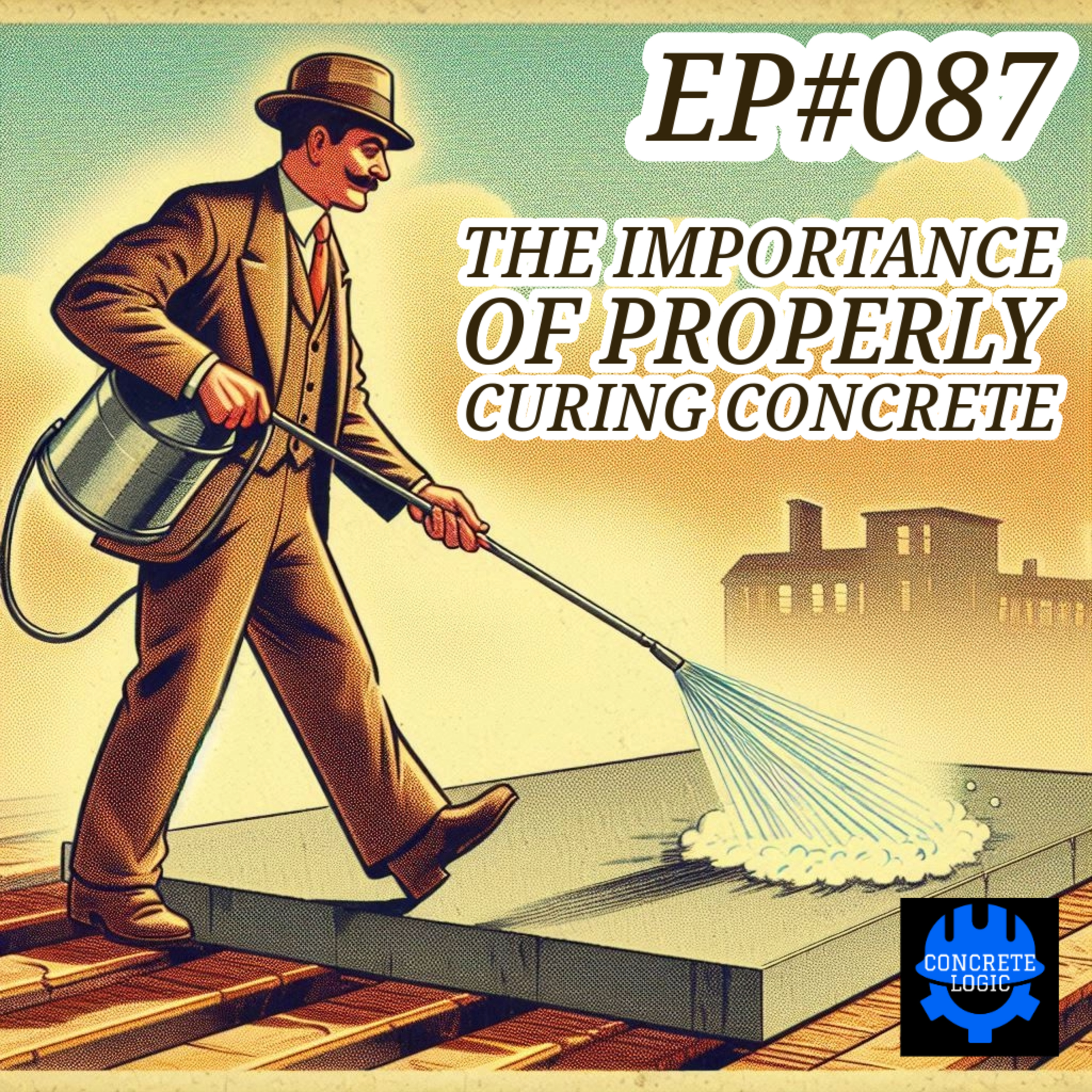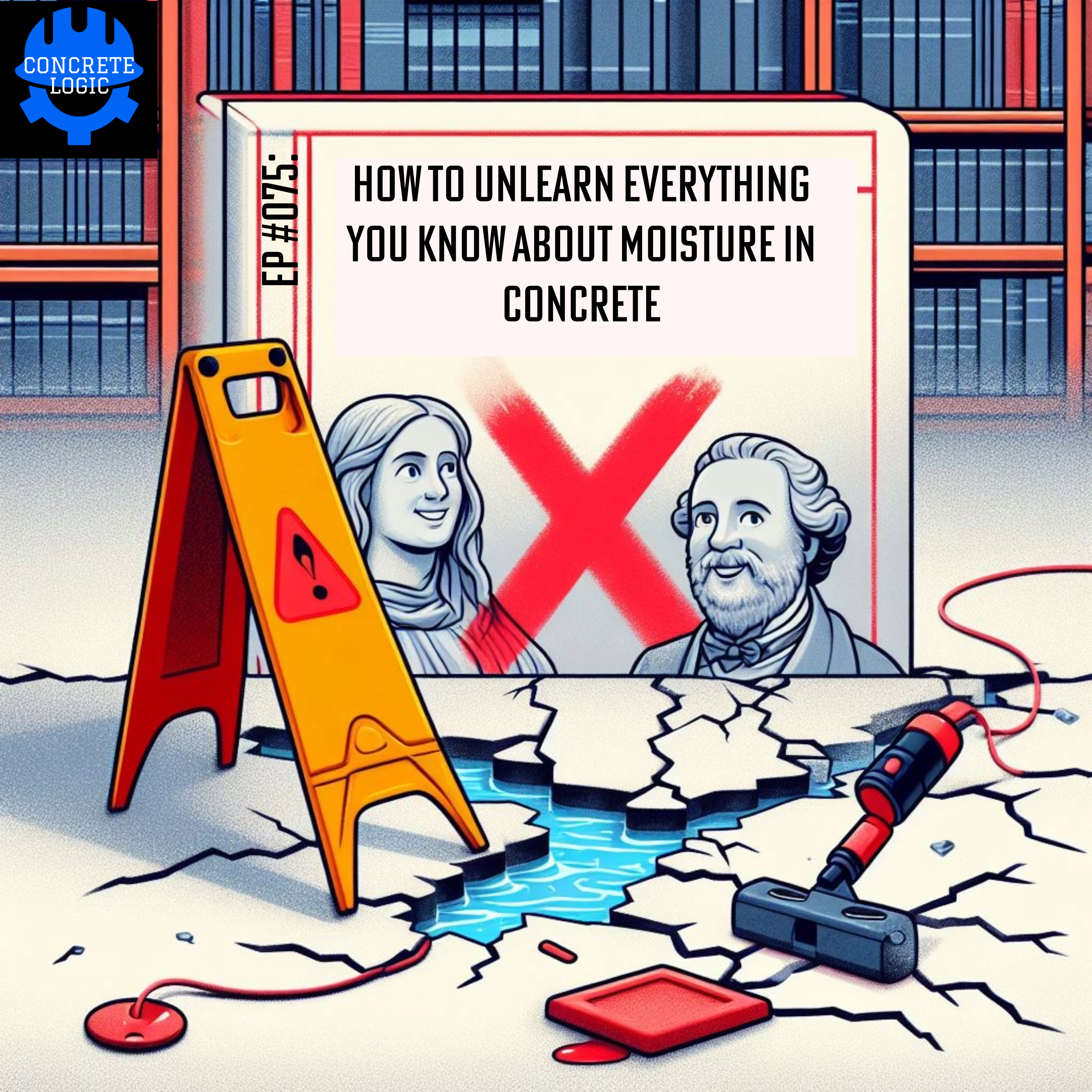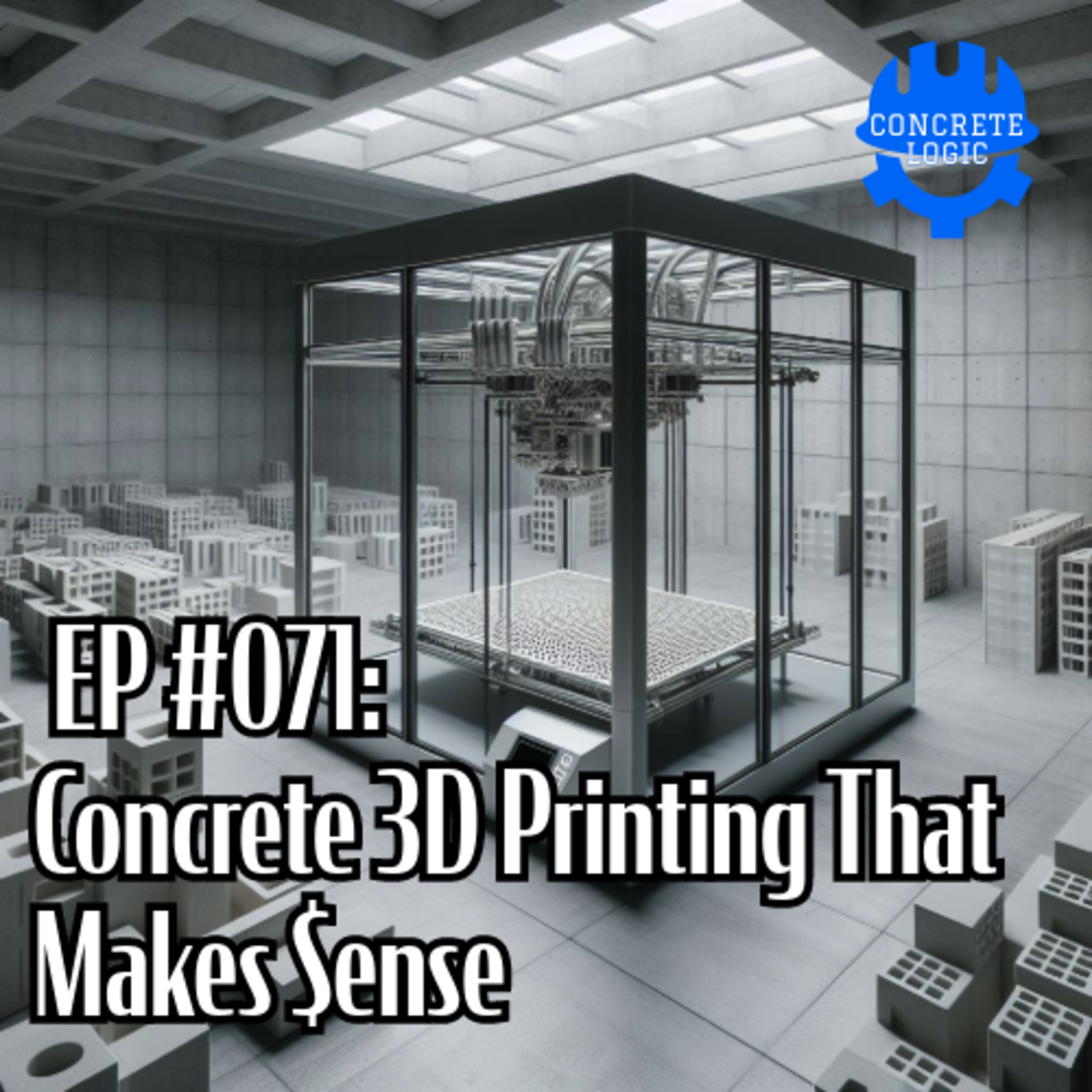
EP #073: Hardened by Law - The Future of Concrete Accountability

Summary
In this episode of the Concrete Logic Podcast, Dr. Jon Belkowitz discusses the lack of accountability among civil engineers in the concrete industry. He highlights the disconnect between the design and implementation of concrete structures, with civil engineers often not present on job sites and lacking knowledge of concrete mix design. Dr. Belkowitz emphasizes the need for engineers to take responsibility for their designs and be held accountable for failures. He suggests that insurance companies and lawsuits may be the catalyst for change in the industry. Dr. Belkowitz proposes a new PE exam focused on concrete to ensure engineers have the necessary knowledge and understanding of the material.
Takeaways
- Civil engineers in the concrete industry often lack accountability for their designs and are rarely present on job sites.
- Many civil engineers have limited knowledge of concrete mix design and rely on ready mix providers for expertise.
- The lack of concrete education in civil engineering programs contributes to engineers' insufficient understanding of the material.
- Copying and pasting solutions without fully understanding the underlying principles is a common practice among civil engineers.
- Insurance companies and lawsuits may be the driving force for holding engineers accountable in the future.
- A new PE exam focused on concrete could help ensure that engineers have the necessary knowledge and understanding of the material.
Chapters
0:00 Introduction and Call to Action
02:00 ACI 132 and Responsibility in Concrete Construction
03:33 Civil Engineers' Lack of Accountability
06:16 Lack of Concrete Mix Design Knowledge
08:51 Insufficient Concrete Education in Civil Engineering Programs
11:37 Copying and Pasting Solutions
13:33 The PE Exam and Lack of Concrete Questions
15:23 Engineers' Lack of Understanding of Concrete Tests
18:04 Lack of Accountability in Concrete Failures
19:03 Engineers' Absence on Job Sites
23:21 The Need for Engineers to Be Held Accountable
26:09 The Role of Insurance Companies in Holding Engineers Accountable
28:25 The Future of Engineer Accountability
31:15 Proposed Changes to the PE Exam
32:08 Conclusion
***
Did you learn something from this episode? If so, please consider donating to the show to help us continue to provide high-quality content for the concrete industry.
Donate here: https://www.concretelogicpodcast.com/support/
***
Episode References
Guest: Dr. Jon Belkowitz | Intelligent Concrete | jon@intelligent-concrete.com Guest Website: https://www.intelligent-concrete.com/
Producers: Jodi Tandett, Jace Stocker
Donate & Become a Producer: https://www.concretelogicpodcast.com/support/
Music: Mike Dunton | https://www.mikeduntonmusic.com | mikeduntonmusic@gmail.com | Instagram @Mike_Dunton
Host: Seth Tandett, seth@concretelogicpodcast.com
Host LinkedIn: https://www.linkedin.com/in/seth-tandett/
Website: https://www.concretelogicpodcast.com/
LinkedIn: https://www.linkedin.com/company/concrete-logic-podcast
[00:00:00] Seth: And welcome to another episode of the concrete logic podcast. And today I got. Back on the show, Dr. Belkowitz, I believe this is going to be a show number six for you, man. Say hi to the audience.
[00:00:15] Dr. Jon Belkowitz: Dr. Jon. Howdy y'all. Thanks for having me again, sir.
[00:00:19] Seth: Just real quick, just to remind everybody how, what I've been asking you all to do is if you feel that this show provides you a value, there's three things you can do to help me out.
There's the first one is to share the show. So share it with a colleague in the industry. Especially the, after this conversation today, I think you'll get something out of it. Yeah. And then the second option you could do is go to the website, ConcreteLogicPodcast.com. And in the bottom right hand corner, there's a microphone, a little icon.
If you click on that, you can leave me a voicemail and you can either do, you could do a couple of things. You could give me a feedback on the show, tell me how good or terrible the show is. Or you could give me an idea on a topic or guest, and if you'd like when you're leaving that voicemail, if you want me to play it on the show, I will play it on the show.
The third way you can help me out is again, a concrete logic podcast. com in the upper right hand corner of the homepage, there is a donation button, hit that donate button, and you can leave any amount. So any if you get some value out of the show whatever you think, what, whatever it's worth, click on that button.
You can donate an amount. So that is it. We're going to roll right in with our conversation with Dr. Jon Belkowitz, which it's always entertaining to talk to Dr. Jon. So today we want to, you want to talk about who's responsible for roll into it.
[00:01:50] Dr. Jon Belkowitz: Okay, so ACI 132, I think it's still R14, talks about guide for responsibility in concrete construction.
And this is something that's been really pissing me off for years. I have been on the legal side of many lawsuits. Or on the engineer side, or excuse me, the ready mix provider side, the contractor side, the owner side, trying to figure out who caused the problem, so on and so forth. And I've been very lucky that I've been part of some larger projects as a consultant to do the same thing.
Many lawsuits care or expert witness been part of a team. And the one thing I have found is a constant civil engineers somehow get a get out of jail free card. They are not held accountable, whether it's on the job site before the lawsuit happens.
Or, after the fact. You never hear of them, never see of them. Maybe a little bit when something falls down and somebody dies. But, let me start off by asking you, Seth. The civil engineer who designs the concrete on a set of structural plans, whether it says, 4, 000, 5, 000 PSI at 28 days a four to six inch slump, a water cementitious ratio, maximum of 0.
- Have you ever seen those people on the job site?
[00:03:26] Seth: are you talking about the person actually stamps those drawings and their signatures on it? Or
[00:03:32] Dr. Jon Belkowitz: both the person who stamps the drawings or the person who comes up with those numbers.
[00:03:40] Seth: I wouldn't say well, there's a representative of that firm.
I've had them out on job sites, but I never thought of asking actually. Yeah. Who actually did the drawings if they walked the job? So I honestly have never asked that question. I just I wanted I want an engineer there. If there's a problem, I want the, structural engineer there. Boots on the ground and they usually its they all assign like a project manager who's, a representative of that specific firm and not the actual person that stamped that drawing and signed that seal.
[00:04:20] Dr. Jon Belkowitz: Right. And that's the funny thing because what the engineer and for your viewers, if you don't know what the civil engineers job, and I'm being a little bit more loose with the term here, because you said structural engineer and that's very specific type of civil engineer.
We can have a stamped qualified professional engineer that's designing bridges as well as building the bridges who is not a structural engineer. They're just civil engineers and they can have any type of PE, whether it's structural. Construction geotechnical. Yeah. They could be designing and building bridges.
Yep. So that person has the ability to specify, require cement content, flash content, water, cement, re ratio, rock and sand content, air content, admixture type, and content. Strength at 28 days, plus or minus 28 days in hours. Flexural strength, how the bridge or how the structure is open, whether it's three beams, 30 beams, or even one beam, one singular beam for an entire highway bridge, for entire bridge, they can use just one singular beam, not a series of beam, but one beam, they have the power to do that.
And I'm going to use Pareto's law. I don't like to live in the world of definitive. But I would say 80 percent on the, of the job sites I have been to, I have not seen a civil engineer, professional engineer who has a stamp, who has done all the shtick that we just mentioned. On the job site. And I want to also include that 80 percent of those engineers have never seen concrete made, whether in a back of a laboratory or in the back of a mixer, and 80 percent of those engineers don't know how to design concrete.
Wow. And no problem going toe to toe with anybody that wants to disagree with me. And by the way, well, there's Tyler Ley. Tyler Ley doesn't count.
[00:06:29] Seth: Well, you said 80 20, so he'd be in the 20.
[00:06:33] Dr. Jon Belkowitz: He wouldn't be in the 20, because he is not one of those engineers who is specifying the concrete for bridges. He is a professor.
He is one of the best professors out there. And he is one of the best champions for the concrete industry. But unfortunately, Tyler is not designing concrete for bridges and he's not stamping concrete for bridges.
[00:06:59] Seth: Yeah. So who's doing that? Who are you seeing that's doing it?
[00:07:04] Dr. Jon Belkowitz: The DOT engineers, the municipal local engineers the engineers who work for private firms that are consultants.
I don't believe, or excuse me, let me say it this way, I do believe that 80 percent of our civil engineering force out there doesn't know the first thing about concrete. Why should they know anything about concrete? When you take a reinforced concrete class, you spend 45 minutes on concrete mixed design.
That's one lecture. When you take the PE exam out of 80 questions, and I love this conversation because I've taken the PE exam many fricking times and I've taken many PE exams. Right, there's one question out of 80 questions, not even 1%, not even 1%, or I guess that is 1%, not even 1%, better know my math is based on concrete.
And the question that they put on there is a BS question about cement. It isn't even work for our industry anymore. We don't even make type four cements in the U. S. anymore. It hasn't happened for years. Right.
[00:08:11] Seth: What is, what's the majority of the test?
[00:08:15] Dr. Jon Belkowitz: Okay that's a topic for a different conversation.
You, that opens up another can of worms.
[00:08:20] Seth: Yeah. Well, you said one question out of 80. 80 is concrete. So I was just curious what was the rest of it. But yeah, we can talk about that another time.
[00:08:30] Dr. Jon Belkowitz: That's a topic for another question. When you go to university to learn how to be a civil engineer, you take many classes starting at statics, how things sit, how forces move back and forth, so on and so forth.
And then you go into different material properties. So, when you get to concrete, the class is normally reinforced concrete design.
I've taught it. I love teaching the class and there, there are two really good books. To use for reinforced concrete. Here's one of them. My favorite one is by NAWI. And when you get into it the chapter on concrete mix design is really good, but again, you only have 45 minutes to cover it. And I tell you, I've spent my better part of my career learning concrete mix design, and it definitely took me more than 45 minutes to learn concrete mix design.
And if you've never, as a civil engineer, taken the time to learn concrete mix design, here's the book, ACI 211, which was recently republished. It is a great, very easy, thin read, and it goes over, you can tell how much I use, I fricking love this thing, it goes over everything that you would wonder about the benchmark for concrete mix design.
But civil engineers don't do this, in that reinforced concrete class, what they really need to know is F prime C at 28 days, 28 day strength. And they're only using 85 percent of that 28 day strength. And yeah, I'm getting into a little bit more or I'm ignoring a lot of it because there's also, well, the tensile strength of concrete is only 10 percent and there's the whole gestalt behind that, but normally what you find with civil engineers when they go through school.
And if I'm hurting people's feelings, I really don't care because I've been through the tenure of many different academic institutions in my long life, and I've seen the consistency between civil engineering programs. And what most civil engineering students do. You ready for this? This is the un, this is the dark and dirty secret of the academic arena, especially when it comes to civil engineers.
You ready for this?
[00:10:56] Seth: Ready.
[00:10:58] Dr. Jon Belkowitz: Most civil engineers don't really do their homework. The foundation that they're supposed to create to learn how to be a problem solver for the people. Cause that's what civil means. It's a Latin word. That means of the people. And as an engineer, you're a problem solver.
That's why we put engineers behind a lot of things, electrical, hydraulic, aeronautical, all of us are problem solvers. And with the same basic equations, all of us should be able to solve the same type of problems. Us, we're problem solvers of the people to solve infrastructure problems, poop problems, water problems, fire problems, so on and so forth, right?
When most civil engineers go to school, they don't solve problems. What they do is they find a problem that is similar to the problem that they have, and then they Plug and chug their material properties into it. And hopefully they get the right answer at the end. That's why when you take a civil engineering exam, the solution is only worth like one or two points out of 20.
It's the whole process to get to the solution that matters. Well, the unfortunate reality, especially when you look at the P. E. exam, which used to be a written exam, now it's multiple choice. So who cares if you know how to do it, you just have to get the answer. And our software is so strong nowadays, our computing techniques are so strong that you don't know how, you don't have to know how to do this shit.
You just plug in the values, and it spits it out for you. So most civil engineers as students, as junior engineers, as apprentices, were copying and pasting their solutions. What the hell do you think they're going to do when they get out to the industry? Oh, they're going to turn over a new leaf? Well, I got here, now I'm responsible, now I'm going to do things differently, no.
A civil engineer who designs concrete is copying and pasting the concrete mix design from their predecessors. And really, they're not even designing a mix. They're giving boundary conditions and they're relying on the ready mix provider to provide the concrete mix design expertise. That's why at the end of the day, when there's a lawsuit, it's the Ready-mix provider that's held accountable, and not the civil engineer.
Because even though the civil engineer is the responsible, qualified person on the job site who has ultimate liability, they have nothing to do with the concrete. They're oblivious. They're indifferent.
[00:13:34] Seth: Even if they review the mix design and approve it? In a submittal?
[00:13:39] Dr. Jon Belkowitz: What does that word review mean? They look at it? What the beep? They don't even know what they're looking at.
[00:13:44] Seth: They require you to submit the mix design for approval.
[00:13:47] Dr. Jon Belkowitz: Yeah, but they don't even know what it means.
[00:13:50] Seth: So what are they doing with it?
[00:13:52] Dr. Jon Belkowitz: They're checking a box.
[00:13:53] Seth: So that doesn't hold up in any of the lawsuits you've been a part of?
They said, they stamped approved?
[00:14:00] Dr. Jon Belkowitz: How about this? How about, forget any of the lawsuits, because that's anecdotal. That's personal experience. It's a wonderful word, by the way. So I'm making a statement based on my personal experience. Sure. Don't believe me. I don't expect your viewers to believe me. Even the naysayers out there who might be, I don't do that, Jon.
That's not the way I do business. 30 years. Well, then you're the part of the 20%, but take a very easy approach and look at any of the epic concrete, concrete failures that are out there. And there are plenty of them. Bridge locks, dams, levees, parking lots, parking garages, houses, foundations, driveway, sidewalks, parking aprons, roller skating rinks, ice rinks, water polo, underground pools.
When has the engineer who has designed, the concrete ever been called to the table? Look at the Surfside Apartments. We know what happened. We know who's at fault. What's happening with that? Look at the dam failure in New Braunfels, Texas. The funny thing about when concrete structures fall down, it's a lot easier to clean them up than it is scheduling demolition.
So a lot of engineers, and that's what people forget, this is what happens when you don't do your homework. And shame on you engineers who are still doing that. This is what happens when you don't do your homework. And that includes throughout your entire span of your career. The reason why I have multiple reinforced concrete textbooks in my office and multiple guides.
In multiple things on selecting proportions and they're all used is because I'm constantly reeducating myself. I can't remember everything, and nobody can remember everything. Sometimes you forget. That's why as engineers. Our job is not to memorize. That's why when you go to take your P. E. exam, you can bring any book that you want.
Because your job is not to memorize, but your job is to be a problem solver. If you're copying and pasting from the word, go, if you're skipping the pain, and the trials and tribulations to get to the answer, you're cheating yourself as well as your future people who are trusting you. Being an engineer is like being a doctor.
Right? If you screw up, people die. And again, you can look, David Harris and Mallory Westbrook, two of the engineers who work for our company, wrote a book years ago called The ABCs of Epic Concrete Failures. Right? And again, do the homework. When you look at the epic concrete failures, engineers are never held accountable.
Now, that's looking at the failures. Let's err on the side of hope. How about going to a job site? Whether it's a 40 story structure or it is a residential community? I have never, ever seen an engineer and man let's go to 80%. I, okay. I apologize for saying never, ever. 80% of the time I've been out to these job sites just for the day to day.
I don't see an engineer out there saying, yep. I prescribed four to six inches on the slump and there it is. Yeah. Thanks for letting me know the air. We're good to go. Yeah. You guys keep going. You're doing a great job. I'll check in on the next truck.
[00:17:33] Seth: Yeah. I think if they step foot on there, wouldn't they be more liable for the outcome?
[00:17:40] Dr. Jon Belkowitz: They're already liable by the book.
[00:17:45] Seth: But we just said, you just told me that they're not
[00:17:50] Dr. Jon Belkowitz: in a court of law, somehow, they get off the hook, but by the stinking book, when you look at this book, when you look at the stick to become an engineer, shoot. When you look at the order of the engineer, you know why I wear this stupid steel ring?
By the way, I hate wearing things on my finger. Right? I'm a person who works in the laboratory, I work in the field. And I've seen people's meat and skin be ripped off. These aren't silicone, right? These are metal. Right? So this is my wedding ring, and I never take it off. Ever. And I know that's a safety hazard.
I know what I'm doing, right? This is my Order of the Engineer ring. I never take it off either. These two, to me, have maybe not equal importance because I don't want to get divorced here in a second or my wife file for divorce. There's a certain significance to these two rings in my life. This is a constant reminder, the order of the engineering came from the Canadians.
They had a bridge go up in Quebec, it was a 1700, doesn't matter when it was, engineers were cheating, cutting corners, it dropped once or twice, people died, money was lost, so the new engineers Took nuts from the bridge and put it on the work the, their pinky of their working hand to remind them of the ups that happened.
Excuse my language is screw ups that happened with the previous people, right? And they still do it. And what the ridges on the ring represent is the obstacles. That we have to overcome as engineers, constant problems of trying to overcome what the earth gives us and the boundary conditions of our materials and then what the customer wants.
We constantly have to get through those and those are never going to disappear. But over time, they're going to wear down because of our experience. If you're starting your experience by cheating, how do we put that expectation that you're going to change your ways? When you get to the top tier and how are we going to create the expectation that the next generation is going to do better than us shame on engineers and myself at one point during my career, I cut at my academic career.
I cut corners. I'm not saying this is a better than now. I'm saying this as a convert. I saw what happened when you don't know your stuff. I worked as an engineer. Right? And my sponsor dad from the Air Force Academy said, hey, listen, man, you're a pretty crappy engineer. And he loved me like one of his own kids.
He's like, what I'm going to do is I'm going to pay for you to go back to school. You can work here from 3 o'clock in the morning to 730 in the morning. And then the rest of the day, go back to school and learn how to become an engineer. Don't take a long time doing it because you've already done it once.
But what you learned. In your career, your academic career, either you didn't take it seriously or it wasn't good enough. But you have what it takes. So I spent the next two and a half years taking a four year degree, I didn't leave my apartment unless I was going to school or going to work, and I just beat the crap out of my brain because I understood what I needed to do and what I had wasted away at doing.
That's why I've been to so many universities. I wanted to exercise everything I could to become the best civil engineer possible. And it's a very hard thing to do. It's not easy. To be a civil engineer. So I understand why people cheat because you could cheat and get away with it. And it's such a, so annoying.
So annoying, man.
[00:21:47] Seth: Yeah.
[00:21:49] Dr. Jon Belkowitz: We had a discussion with one of the ready mix providers and they said that their new D O T that they're working with is requiring them to run surface resistivity on their concrete. I said, Oh, okay. Why? I said, well, that's because they want durable concrete. I said, well, why, but why do you have to run surface resistivity?
What if he did a permeability test? No. No. It has to be surface resistivity. I said, great. I would love to meet this DOT engineer. So we got to sit down with the DOT engineer, and I asked the question, why are you using surface resistivity? That's what Jim told us to do from the federal highway association.
What does that mean?
[00:22:38] Seth: right.
[00:22:39] Dr. Jon Belkowitz: Why, what is Jim over at the Federal Highway Association running surface resistivity? What does that have to do with you? Do you know what's, you know what surface resistivity measures? Well, we have numbers that tell us. I said no. Why are you running, like, what is the significance of surface resistivity?
Because I don't know if you know this be, but with surface resistivity, you can get false readings, so you kinda have to understand the test. Before you start running it, it's not a compressive strength test. It's not like one number tells us everything we need to know about compressive strength. Well, we have the number as long as we're in that range.
We should be good. I said, did you just fricking hear me? And it's that copy and paste mentality. Somebody told me to do something. Well, I read a paper. Here's another DOT. Well, I read a paper, and they were using 7 percent silica fume in their decks. So we're going to do the same thing in our pavements is we're going to use 7 percent silica fume for durability, and we're going to do a 3000 linear feet job on it.
Why? Who told? Where did the research come from to validate that for your concrete? Because good concrete practices, the guide to responsibility for concrete construction tells us all of our PE stuff, everything we learn about concrete tells us good concrete practices dictate we try things out before we go to the field.
Now let's do 3000 linear feet with 7 percent silica fume because Jason Weiss wrote a paper, bless Jason Weiss and all his awesome papers, but that is the copy paste mentality. That our engineers are using and they're getting away with it because nobody holds them accountable.
[00:24:24] Seth: Well, what do you do in that scenario where someone's just taking what they're reading or taking the advice from someone.
What is the right way to do it? What's the right way for them to know what, what they're designing, what they're asking for?
[00:24:42] Dr. Jon Belkowitz: I tell you it's very, there's two ways and it's, people are going to get mad at me for saying this, it's not my job to tell people what they're supposed to do, right?
I can't do that. That's why they have their own stamp, right? That's why the stamp has their name at the top of it in full, there's no abbreviations. The question is, when is this going to change? When our civil engineers are literally called, you know what EOR stands for?
[00:25:09] Seth: Engineer of Record.
[00:25:10] Dr. Jon Belkowitz: Engineer of Record. Do you know that Engineer of Record has an aggregate insurance policy?
Errors and omissions.
So if somebody dies because of why I did, I have to pay more of my insurance policy has to, deal with that stuff, right?
It's like a 2 million, 10 million aggregate. It's not a small amount, right? Because when people and things die, it costs a lot of money. So the way it's going to change Are you ready for this? Can you guess how it's going to change?
[00:25:39] Seth: No, go for it.
[00:25:41] Dr. Jon Belkowitz: Yeah, you can. Come on. Wild guess. How is it going to change on the engineer side?
[00:25:46] Seth: Or when we start talking about insurance, my, my mind goes that way.
[00:25:52] Dr. Jon Belkowitz: Right. Do it. Go it. How are the civil engineers who are rarely on the job site who are never held accountable? How is that dynamic going to shift? How are they all of a sudden going to be start being held accountable, not only at the top tier, but all the way down the chain of command to the academic institutions?
How is that going to change? How are we going to start seeing them on job sites?
[00:26:15] Seth: Insurance companies are going to require it, or they're going to charge them more, or they're going to go after them when one of these things happens.
[00:26:25] Dr. Jon Belkowitz: They're gonna get sued. Like it didn't take us long to get there. Right.
[00:26:29] Seth: Yep.
[00:26:30] Dr. Jon Belkowitz: That's the way. And crucify me if you want to industry, I cannot wait till that happens.
[00:26:37] Seth: Yeah.
[00:26:38] Dr. Jon Belkowitz: I am looking forward for the attorneys to start holding these engineers. Accountable and hey, you have insurance policies. That's what insurance policies are made for. Even doctors, even medical doctors make mistakes.
We are human. That is why we put erasers on pencils. We make mistakes. That's why engineers, when we're going through school, we're told to use pencils on our homework so we can erase and rewrite it because we made a mistake. That's what happens. happens. Yeah, I definitely think. And for you attorneys out there, I have some very good friends who work in this arena.
There is a wonderful cash crop out there for you to take advantage of, because that is rarely happening now. And it is so easy to go after civil engineers because they are not prepared to defend themselves. The first civil engineer who gets held accountable will deer in frickin' headlights. Am I saying that incorrectly, Whit?
Whitney disagrees. She's married to me. She has to agree with me.
[00:27:46] Seth: I've heard her disagree with you.
[00:27:47] Dr. Jon Belkowitz: What?
Every now and then.
[00:27:49] Seth: that's very interesting. I gotta get someone on that side. Like a lawyer or insurance guy on this show and talk about that.
[00:27:56] Dr. Jon Belkowitz: Get an engineer who disagrees with me.
That's not true, Jon. We're held accountable.
[00:28:02] Seth: I don't think that'll be hard to find someone that disagrees with you, Jon.
[00:28:05] Dr. Jon Belkowitz: I know a very good engineer, and so does Whitney, who will agree with me 100%. Remember? You know who, Gene? I'm not gonna say his last name. Gene, doesn't matter who he worked for, he was a water tank engineer.
He used to come out with a video camera that had a disc. In it video camera with a disc. He came out with a clipboard that had a lock, a metal clipboard that had a lock with his notes in their chains to do change racks, right? And I remember the first time I saw this. I said, Gene,
What the F are you doing? Making sure I don't get sued, Jon.
[00:28:48] Seth: Yeah.
[00:28:49] Dr. Jon Belkowitz: He fits into the 20 percent cap.
[00:28:50] Seth: All right. Well, you feel better now?
[00:28:54] Dr. Jon Belkowitz: No. No. We haven't changed anything. I would like to, what I want to propose, and if you have anybody in your subscriber base who works for NCEES, I would like to start after I finished this ASTM, I want to start a new PE exam that focuses just on concrete.
And I want it to be a two day exam. Ooh. 16 hours. Forget this eight hour, 80 question horse crap. 16 hours, I want there to be a multiple choice and a written portion. Good deal. All right. Excited about this stuff.
[00:29:34] Seth: You do get excited about this stuff. That's why it's fun to have you on here.
[00:29:38] Dr. Jon Belkowitz: I know, but it's draining.
[00:29:40] Seth: All right. Well, that's a good spot to end. So, you, everybody knows how to get a hold of Dr. Jon Belkowitz. But I'll share all that stuff in the show notes as usual. Jon, thank you for coming back on. Appreciate it. Always fun. And folks until next time, let's keep it concrete.
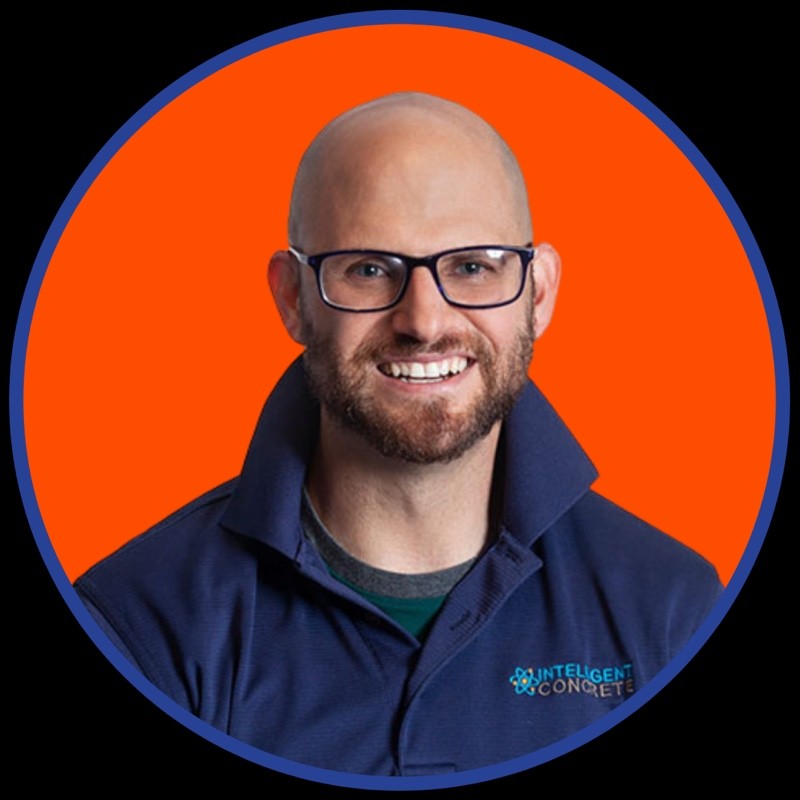
Dr. Jon Belkowitz
Jon Belkowitz is the CEO of EDYSTON, LLC and CTO at Intelligent Concrete, LLC. Before Intelligent Concrete, LLC, he served in the United States Air Force from 1996 to 2006 specializing in Civil Engineering. His tour of duty introduced Dr. Belkowitz to a wide variety of concrete types and uses which were dependent upon the engineering practices of different host nation forces, developing nations, and disaster repair initiatives. Jon has worked in private laboratories on structural engineering and materials development projects to include the application of nanotechnology in concrete. Dr. Belkowitz has worked as a consultant on projects in the United States, India, Turkey, Africa, Italy, New Zealand, Australia, and Germany. Jon has worked as Chief of Materials for a 3D concrete printing firm, an advisor for NASA on 3D printing of concrete holds patent applications on 3D printing with concrete, and is an ACI member on the subject. Jon received his Masters of Mat Science from the University of Denver and his Ph.D. in Mechanical Engineering with a specialty in Nanotechnology in Concrete at Stevens Institute of Technology in New Jersey. Jon is a licensed Professional Engineer in Colorado and Maryland.









